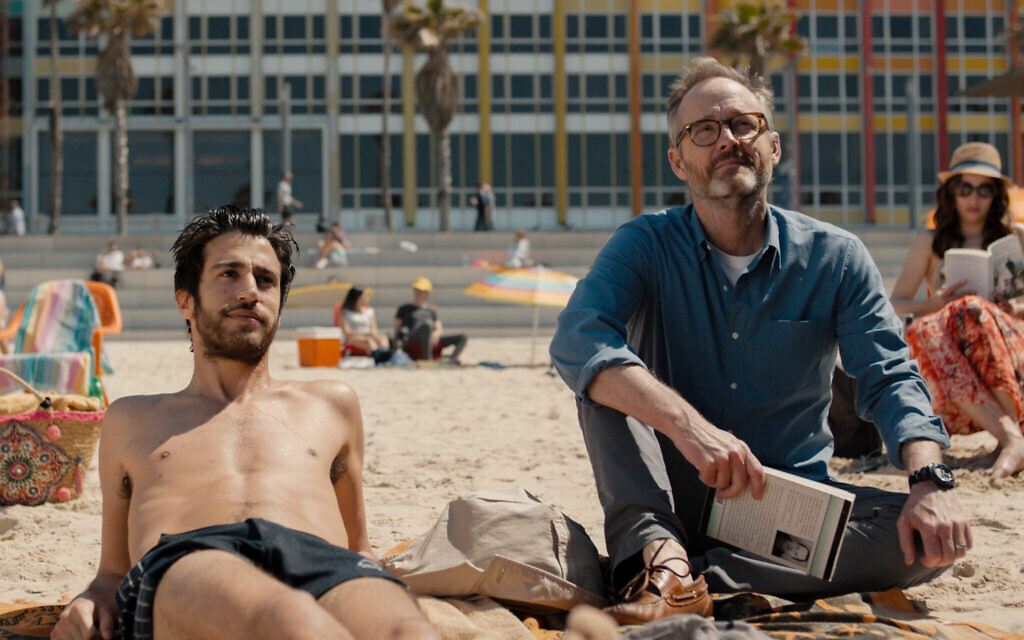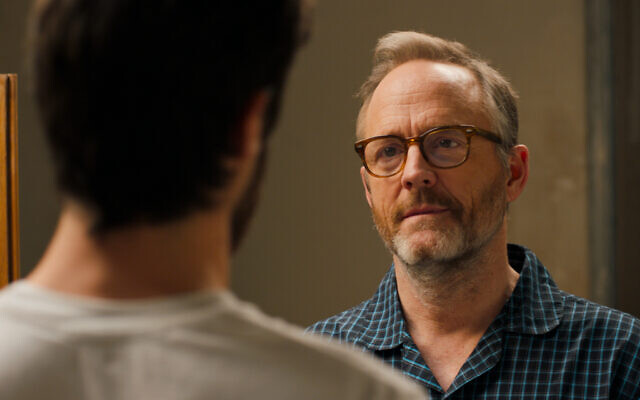Two gay men, one an older American, one a cocky young Sabra, explore Tel Aviv in the Israeli director’s newest release, out now in select US theaters and via on-demand from July 9

NEW YORK — One thing that’s true all over the world is that you can’t really understand a city unless you get to know the people who live there. Luckily for Michael, a middle-aged travel writer played by American actor John Benjamin Hickey, his plans take on a characteristically Israeli twist when he lands in Tel Aviv for a five-day overview. Tomer, the young artist played by Niv Nissim from whom Michael has subletted an apartment, has the dates wrong, initiating what becomes a brief but very sincere exchange between the two men in Eytan Fox’s new film “Sublet.”
Currently playing in select North American cities and available to rent via Video On Demand starting July 9, “Sublet” examines a fascinating generational divide between these two gay secular Jewish men. It also makes for one heck of an ad campaign for booking the next flight to Ben Gurion Airport and hitting the beaches with a tall, cold glass of freshly squeezed pomegranate juice.
Fox, whose previous films include the well-received “Yossi & Jagger,” “The Bubble,” and “Cupcakes,” spoke with me via Zoom from his home in Tel Aviv as “Sublet” opened in New York City. Though it was late at night for him, Fox had an exuberance, energy, and amiability that jumped out of my laptop screen — not exactly a surprise after watching this joyful movie. I also noticed that he sat in front of what might be the largest collection of recorded music I’d ever seen outside of a library. Below is an edited transcript of our conversation.
Eytan Fox: My partner, Gal Uchovksy, is a music critic. We’ve got everything: classical, old Israeli music, hip-hop, ’70s, ’80s, ’90s, whatever you want. This is just a third of what we used to have, because who needs CDs nowadays, right? These were the ones he couldn’t put into storage.
I ditched most of my CDs for digital, too. Time moves on. And that’s a lot of what your movie is about, too, in a way. Learning to adapt.
Yes. Or, well, maybe not! Maybe saying, “That’s your life, young people, do your thing, and let us do our thing. Let us live our lives the way we know them and love them.” It’s a mix.
Michael, the older man, and Tomer, the younger man, meet and get to understand each other better through this encounter. And perhaps because of the meeting they understand themselves better. We in the audience, we get to watch the conflict, old versus young, being gay in the 1980s and ’90s versus being gay in 2020.
I feel like there ultimately isn’t too much judgment between them, even if there is confusion.
It’s gradual. I mean, the film… only [takes place over the course of] five days, but Tomer starts out a little bit of a prick. We had early cuts where audiences said, “We don’t like the young guy.” He was too aggressive.
I wanted to capture that typical cocky Israeli who knows it all, but underneath is warm and loving, which I feel is very specific of young Israelis. The “thorns of the Sabras” who can seem aggressive and loud, but deep inside they care so much about family and their community.
I love Tomer’s pride in his neighborhood, how he demands Michael throw away the guidebook.
When I walk down the street, if I see a tourist with a map on their phone I’ll stop and say, “How can I help you? Can I walk you there?” Then I think, “Why am I doing this? This is not me! I am not usually this kind of wonderful person!”
But it’s because I want them to love Tel Aviv. It’s so important to me. Tomer says as much: “I want them to fall in love with us. I want them to not hate us!”
There’s been so much criticism against Israel. And it’s important to say, “We are the good Israel. I am the good Israel.” Look beyond the bad politicians and the bad rabbis. Look at secular Tel Aviv, we’re wonderful, we want peace, we want good relationships with our neighbors.
Since you brought it all up, I live in New York City and work in media, so for many of my colleagues any suggestion there might be a “good Israel” isn’t going to fly. A movie like “Sublet” — which would be good if it were set in Indianapolis or Sydney or anywhere — if you tell a lot of these people to see it, they’ll say, “Oh, it’s just ‘pinkwashing’ Israel.” I am sure you are familiar with that term.
Of course, and I’ve been familiar with it for years and years. It’s a real fear of ours now, that people will say, “I will not see any Israeli film, period.” It can be the most left-wing, pro-Palestinian Israeli film ever made and some say they will still boycott.
I have been accused of being part of a “pinkwash” system. And maybe it has happened. Maybe my work has been used by Israeli government officials or politicians to create a feeling that Israel is so wonderful and progressive with its LGBT community. It might truly be the case.
But! This doesn’t take away from the fact that the LGBT community in Israel is in such a wonderful place.
We are so embraced by Israeli society now. It took time. It started in Tel Aviv and then moved to other parts of the country. My partner Gal started an LGBT youth movement, and it’s everywhere. It has branches in Arab villages and in a religious community in Jerusalem. I don’t know of too many other places in the world that have this.
With social media and the internet, what used to only be in Tel Aviv can be seen everywhere. You no longer have to say, “I need to move to Tel Aviv.” We have a community in Afula, in Jerusalem, in the desert. Where there is no youth group, we’ll create one.
It’s funny you mention technology, which clearly has its positives, as you’ve just described. The premise of a broke artist making a few bucks subletting his apartment via an app instigates this whole movie. But your film certainly takes a, shall we say, nuanced view of dating apps.
It’s funny you mention technology, which clearly has its positives, as you’ve just described. The premise of a broke artist making a few bucks subletting his apartment via an app instigates this whole movie. But your film certainly takes a, shall we say, nuanced view of dating apps.
I need to temper my criticism of young gay people and their lives with dating apps. It’s very much not me or my world. If I was a young gay man who had to use Grindr I’d find it very difficult. I don’t know how young people do it, frankly. But that’s because I’m older!
Michael even says, “What kind of way is this to meet people, it’s like ordering a pizza,” and Tomer says, “A very easy way.” No drama, right?
And Michael tries to be a part of it — but he can’t handle it, he finds it offensive. But I don’t want to say that; I’m trying to understand it. A lot of young people find happiness living their lives this way. Happiness maybe doesn’t have to be about longtime relationships. The most important thing is finding happiness wherever you can.
One of the other great moments isn’t just about an age divide, but an Israeli-Diaspora divide, when the young dancer says she’s going to Berlin. People who pay attention are aware of the huge Israeli ex-pat scene there, but Michael is oblivious and seems shocked because, you know, “Germany?” What I love is the younger people don’t even have the energy to explain. They just benignly laugh at him.
It is amazing, isn’t it? I sometimes think how young people seem so unaware of the deep layers of this strange thing. To move to Germany of all places, back to where [the Holocaust] started. When I say this, people look at me like, “What are you talking about? God, you are old!”
I still think there’s something about this that people may be repressing or denying. Nevertheless, it is wonderful that this repaired, special relationship is happening between Israelis and Germans. It’s a good thing, and good that young Israelis look at me like, “What are you talking about?”
As far as a rift with American Jews, it’s true sometimes. American Jews come here and can be shocked, even at the jokes. Holocaust humor is something that surprises Americans. Or even just an American’s perception of how Israelis should engage in Judaism.
I’ll tell you a story. Years ago I was at the Jerusalem Cinematheque, run, at the time, by a wonderful woman named Lia Van Leer. She had an event for American women from Hadassah, the group that raises money for hospitals. She hosts a screening of my first feature called “Song of the Siren.” This is way back in 1994. The movie is a romantic comedy between a young woman and four different men during the Gulf War. Oh, and as a by-the-way, one of the stars of the film happens to be Yair Lapid, who will eventually be our prime minister. He was a hunky model/actor at the time.
Anyway, these women came to Jerusalem to talk about Judaism and contribute money, and they saw this movie and turned to Lia Van Leer, this important and elegant woman, and said, “Why are you showing us this film? Is this how a Jewish woman should behave? Where are her values? Where is her Judaism? She’s fooling around with all these men!”
And Lia set them straight. She said this is who we are. We are not only saints who only care about our Jewish history. We have our lives. We go out, we go shopping, we have sex, we have cocktails, it’s not just prayer.
For me this was an incredible moment that showed what some Jewish people expect out of Israel.

Certainly there are Jews who anticipate coming to Israel their whole lives, and when they arrive not everything jibes with what they had in mind. But you can maybe say this about Italian-Americans who go to Rome, too.
Yes. But we do have so many specific, additional aspects to the conversation. The Holocaust. Antisemitism. For Italians? Arguing about the food, maybe.
There’s so much good Israeli food in this movie. What do you look for in a glass of pomegranate juice?
There are so many great juice stands in Tel Aviv now. I look for something sourced from a good farmer, but also a good smile from the server. Look how I checked my white shirt — you say pomegranate juice, I automatically check for the spill.

Speaking of shirts, I need to ask: the dancer character, she is wearing a shirt from Stone Mountain Park in Georgia. I’ve never been there, but I know about it because friends who grew up in the South complain about going as a kid. They have this enormous carving of the Civil War generals and a cheesy laser light show. What’s the story there?
Young people all over the world know about each other. They go online and order a “cool shirt” even if they don’t know what it means. They like how it looks. Do they have a history with this shirt or what it represents? No! That’s an old person question! It’s just cool! Look at the cool image and the cool lettering.
I asked the wardrobe people about it. I asked, “What does this mean?” They said, “Eytan, you are so heavy.” I don’t know if that’s the correct word in English, but they told me not everything has to mean anything. It means it’s a mishmash. She has an Indian skirt, and this cool T-shirt, then something else is thrown in, and that’s how she dresses.
I said okay. I took responsibility for Michael’s wardrobe. Light blue button-down shirts from J. Crew or Banana Republic, with chinos. And that’s all he’ll wear because that’s what I know. The young people can handle the rest. That’s the exchange.
As reported by The Times of Israel
